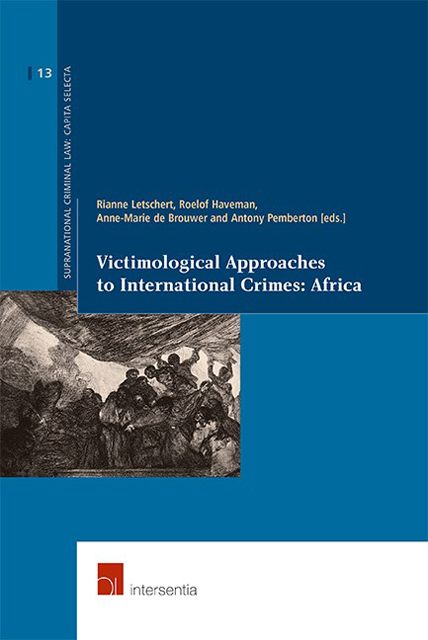Book contents
- Frontmatter
- Words of Appreciation
- Contents
- Introduction: Victimological Approaches to International Crimes
- Part I Victims of International Crimes
- Part II Reparative Justice
- PART III Amnesty, Truth, Reconciliation and Tradition
- Part IV International and National Legal and Policy Approaches
- Part V Victimological Approaches to International Crimes
- The Authors
- Bibliography
XIII - Voices from the Field: Empirical Data on Reconciliation in Post-War Bosnia and Their Relevance for Africa
Published online by Cambridge University Press: 24 November 2022
- Frontmatter
- Words of Appreciation
- Contents
- Introduction: Victimological Approaches to International Crimes
- Part I Victims of International Crimes
- Part II Reparative Justice
- PART III Amnesty, Truth, Reconciliation and Tradition
- Part IV International and National Legal and Policy Approaches
- Part V Victimological Approaches to International Crimes
- The Authors
- Bibliography
Summary
INTRODUCTION
‘Reconciliation’ has become one of the buzz words of the last decade. Rooted in the work of the South African Truth and Reconciliation Commission (hereAfter: TRC), it has rapidly conquered the world of international politics and international law. The 2003 Brahimi Report included “conflict resolution and reconciliation techniques” in the set of peace-building tools, and the Utstein Study indicated that reconciliation is one of the strongest post-conflict sectors in attracting western donors’ funding (on this point see Smith 2004). According to former UN Secretary General KofiAnnan in his 2004 report on the rule of law and transitional justice in conflict and post-conflict societies, reconciliation is one of the proclaimed transitional justice goals. The United Nations declared 2009 to be the ‘international year of reconciliation’, recognising
that reconciliation processes are particularly necessary and urgent in countries and regions of the world which have suffered or are suffering situations of conflict that have affected and divided societies in their various internal, national and international facets.
In other words, there is a growing awareness that a lack of focus on the legacy of the past violence will undermine democracy consolidation.
Indeed, the notion of reconciliation has gained momentum during and After times of political transitions, when societies are moving away from an autocratic regime to more democratic forms of government. At that time, the new elites are openly confronted with the fundamental question on how to address the heavy burden of their dark past and if they aim at organising a period of ‘transitional justice’. The latter is defined in older writings as “the study of the choices made and the quality of justice rendered when states are replacing authoritarian regimes by democratic state institutions” (Siegel 1998), and has expanded more recently to include “the full range of processes and mechanisms associated with a society's attempts to come to terms with a legacy of large-scale past abuses, in order to ensure accountability, serve justice and achieve reconciliation”.
- Type
- Chapter
- Information
- Victimological Approaches to International Crimes: Africa , pp. 335 - 352Publisher: IntersentiaPrint publication year: 2011
- 1
- Cited by



